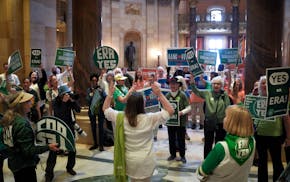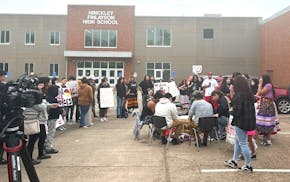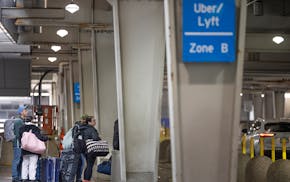Evidently hearing ad nauseam that, "In this economy, you're lucky to have a job," isn't consolation sufficient to sweeten Americans' sour attitudes about their work. The latest Conference Board survey of 5,000 American workers -- that is, those still employed -- found more widespread dissatisfaction on the job than detected by any similar survey since measurement began in 1987.
Only 45 percent of American workers surveyed said they are satisfied with their jobs. That's down from 61 percent in 1987 -- and that's trouble for a nation that needs an abundance of worker zeal to compete in the global economy.
Notable among the results is their generational uniformity -- except for the youngest workers. Those beginning their working lives were the unhappiest of all. Only a third of people surveyed under age 25 said they like their work.
That finding brought to mind a recent holiday gathering of a dozen or so young would-be professionals under age 30. Well-educated -- some with advanced degrees -- and ambitious, these young people would have been snapped up by smart employers in their chosen fields in the 1990s. Today, to a person, they're either unemployed or underemployed, struggling to find jobs that match their qualifications.
"Our expectations got so high in the 1990s," one of the group said, reflecting on his disappointment with the dearth of suitable job options. "We were told we could do anything we wanted. Well, that's not turning out to be true."
Not yet, anyway. To those young people, Minnesota state demographer Tom Gillaspy recently had a word of advice: Hang on. Improve your skills. Your prospects are bound to improve -- not immediately, perhaps, but soon.
Gillaspy notes that while a sizable segment of the American workers born soon after World War II may have put off retirement during the 2008-09 recession, they won't keep collecting their paychecks forever. "Retirement is like a freeway," he said. "The cars are stacking up at the entrance ramp. Eventually, the light will change, and they'll move ahead."
He predicts that when it comes, the surge of opportunity for millennial-generation young workers who have marketable skills will be so great that, on average, they will have more lucrative and responsible careers by age 35 than their baby boomer parents had.
The key phrase in that prediction is "marketable skills." Recession not only impedes job advancement, but also squeezes the funding streams for the higher education institutions that impart those skills, and the financial aid that helps needy students acquire them. Keeping the higher education pipeline open and productive is crucial to improving workers' achievement, which goes hand-in-hand with both satisfaction and with prosperity.
But if better days are coming for the working cohort that is now America's least satisfied, prospects aren't as clear for their elders. This recession produced more widespread wage cuts than any previous one in workers' lifetimes, state economist Tom Stinson has noted. Rapidly rising health care costs have pinched take-home pay, even as the link between employment and health insurance has compelled some workers to stay in jobs they would rather leave, for the sake of affordable medical bills.
Legislation that gives workers in that situation more health insurance options may be a key to improving their overall satisfaction. It would make them better able to move to another employer, go back to school or start a business.
That in turn may inspire employers to think anew about a truism that some seem to have forgotten in recent years. It's that in the long run, cultivating employee loyalty among the best workers is in an enterprise's best interest.

Let voters decide on Equal Rights Amendment

Readers Write: Graduation, child care, midwifery, Timberwolves fans

How to avoid an Uber/Lyft disaster



